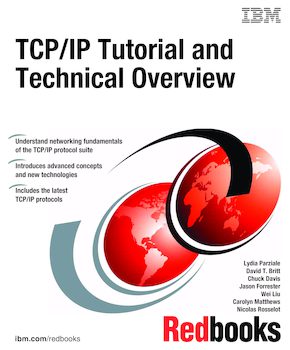TCP/IP Tutorial and Technical Overview
An IBM Redbooks publication
Note: This is publication is now archived. For reference only.

Published on 19 December 2006
ISBN-10: 0738494682
ISBN-13: 9780738494685
IBM Form #: GG24-3376-07
Authors: Lydia Parziale, Dr. Wei Liu, Carolyn Matthews, Nicolas Rosselot, Chuck Davis, Jason Forrester and David T. Britt
The TCP/IP protocol suite has become the de facto standard for computer communications in today's networked world.
The ubiquitous implementation of a specific networking standard has led to an incredible dependence on the applications enabled by it. Today, we use the TCP/IP protocols and the Internet not only for entertainment and information, but to conduct our business by performing transactions, buying and selling products, and delivering services to customers. We are continually extending the set of applications that leverage TCP/IP, thereby driving the need for further infrastructure support.
It is our hope that both the novice and the expert will find useful information in this publication.
Part 1. Core TCP/IP protocols
Chapter 1. Architecture, history, standards, and trends
Chapter 2. Network interfaces
Chapter 3. Internetworking protocols
Chapter 4. Transport layer protocols
Chapter 5. Routing protocols
Chapter 6. IP multicast
Chapter 7. Mobile IP
Chapter 8. Quality of service
Chapter 9. IP version 6
Chapter 10. Wireless IP
Part 2. TCP/IP application protocols
Chapter 11. Application structure and programming interfaces
Chapter 12. Directory and naming protocols
Chapter 13. Remote execution and distributed computing
Chapter 14. File-related protocols
Chapter 15. Mail applications
Chapter 16. The Web
Chapter 17. Network management
Chapter 18. Wireless Application Protocol
Chapter 19. Presence over IP
Part 3. Advanced concepts and new technologies
Chapter 20. Voice over Internet Protocol
Chapter 21. Internet Protocol Television
Chapter 22. TCP/IP security
Chapter 23. Port based network access control
Chapter 24. Availability, scalability, and load balancing
Appendix A. Multiprotocol Label Switching